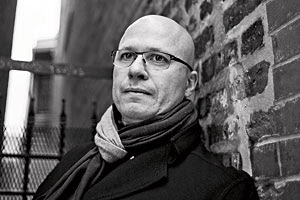For the writer, whose new novel is ''The World and All That It Holds,'' the ideal reading experience involves ''dreaming of the characters and their dilemmas, picking up the book as soon as I open my eyes.''
.- What books are on your night stand?
Ray Monk's ''Ludwig Wittgenstein : The Duty of Genius.'' Oliver Sacks's
''Musicophilia : Tales of Music and the Brain.''
'' The 1619 Project,'' created by Nikole Hannah-Jones and edited by Caitlin Roper, IIena Silverman and Jake Silverstein.
Barbara Ehrenreich's "Dancing in the Streets : A History of Collective Joy."
Brenda Hillman's ''In a few minutes Before Later.''
.- Describe your ideal reading experience [when, where, what, how].
A mountain cabin in the fall. Cowbells in the fog outside, fire in the fireplace.
''Sketches of Spain,'' or Bach's cello suites, and nothing else to do.
Reading 400-500 pages a day, eventually reaching a state of trance, including dreaming of the characters and their dilemmas, picking up the book as soon asI open my eyes to see what happened to those people. I haven't experienced this in more than 30 years.
.- What's your favorite book no one else has heard of?
I assume that if I know the book there would be other people who know it too. Having said that, one of the great underrated writers in Danilo Kis, whose book ''A Tomb for Boris Davidovich'' is an absolute masterpiece, relevant once again in the light of the Russian genocidal aggression.
.- What's the most interesting thing you learned from a book recently?
Wittgenstein didn't trust English doctors, so when he had to have his gallstone removed he refused to do it under general anesthesia. He arranged mirrors in the operating room so he could watch the surgery.
It was incredibly painful, so a friend sat by his side throughout the operation, holding his hand. Wittgenstein was also a virtuoso whistler, and could whistle perfectly whole symphony movements.
.- Which subjects do you wish more authors would write about?
Music. It is very difficult to write about music, certainly in a novel. Among other things, representing the experience of music often diminishes it, not unlike representing sex, because it is essentially a sensory experience.
I've been making music [as Cielo Hemon] and the joy of being inside it, making it, producing it, is hard to convey, or even understand. There are a lot of people writing about music as a social phenomenon [which of course, it is ] but few dare approach it as a sensory experience.
.- Which genres do you especially enjoy reading? And which do you avoid?
I mainly read books about history, music, and also a lot of poetry, sometimes novels. No advice books, least of all self-help manuals, nor any of those middlebrow smartass books that explain humanity and its evolution and history in under 500 pages and a couple TED Talks.
.- Disappointing, overrated, just not good : What book did you feel as if you were supposed to like and didn't? Do you remember the last book you put down without finishing?
I never think that I am supposed to like or not like a book. I frequently put down books after reading the first page. I have dropped books I enjoyed reading, because I picked up another book. I also sometimes finish books I dislike from the beginning.
I intensely disliked Philip Roth's ''The Human Stain,'' found it vile and full of lies [but I finished it]. Over time, it has revealed itself as being positively proto-Trumpist.
''American Pastoral'' is deplorable too. Roth's steadfast commitment to the many privileges of male whiteness reliably repels me. I also dislike a lot of recent books, but I don't wish to name them. Bad books are as hard to write as the good ones.
.- What books are you embarrassed not to have read yet?
None. I don't see why I should be embarrassed for not reading [ or reading ] any book.
The more I read, the less I read, because each book leads to many other books, so I become more aware of the books I have not read. However, that does not provoke embarrassment but curiosity.
.- What are you planning on reading next?
''Music, Math and Mind : The Physics and Neuroscience of Music,'' by David Sulzer.
The World Students Society thanks The New York Times.

.png)


0 comments:
Post a Comment
Grace A Comment!